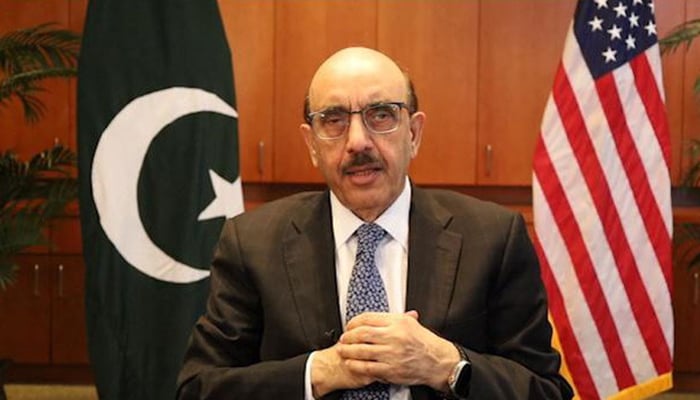Pak envoy to US terms fair distribution under Indus treaty key to regional stability
Pakistan is fully aware of severe challenges in the energy and water security sectors, says Ambassador Khan
ISLAMABAD: Pakistan Ambassador to the United States Masood Khan has underscored the need for a fair and just distribution of waters under the Indus Waters Treaty (IWT), terming it key to energy and water security and regional stability.
“Building a number of dams on the upper riparian parts of the rivers under Indian control eroded trust and creates myriad crises for Pakistan that included flooding, droughts, water scarcity and disruption of energy supplies. The outstanding issues must be resolved quickly and definitively,” he noted.
Khan's remarks came as the first hearing in a spat between Pakistan and India pursuant to the IWT began on Friday at the Permanent Court of Arbitration after the Modi-led Indian government persistently denied to address the concerns Pakistan raised at the Permanent Indus Commission and during government-level talks.
The dispute brought before the court pertains to concerns raised by Pakistan over India’s construction of the 330 MW Kishenganga hydroelectric project on River Jhelum as well as Indian plans to construct the 850 MW Ratle Hydroelectric Project on River Chenab in the Indian Illegally Occupied Jammu and Kashmir (IIOJK).
Masood added that Pakistan was working closely with the US to unlock a climate-resilient ecosystem.
He said the recent initiatives, namely, ‘Green Alliance and Climate Smart Agriculture’ would benefit farmers and create a framework for conserving water, building small dams and improving yields of staple crops like wheat, rice and cotton.
“We will leverage Pakistan-US partnership to transition to renewables, water conservation and efficient use of water,” Ambassador Masood Khan made these remarks as a key-note speaker during a discussion, attended virtually, on “Pakistan’s energy and water security landscape” organized by Baker Institute, Rice University Houston, a press release said on Saturday.
US policymakers, members of the think-tank community, intelligentsia and area experts participated in the discussion.
The ambassador said that Pakistan’s entire ecosystem was sensitive to extreme weather patterns.
“With the help of the international financial institutions, we have initiated reforms for water conservation, transition to modern agricultural technologies, re-afforestation, waste-water management and water metering,” he added.
Masood Khan said that Pakistan, fully cognizant of the serious challenges being faced in the fields of energy and water security, was taking consistent steps to improve its power generation through diversification of its energy mix.
He said that in the past decade, Pakistan had commissioned more than 10GW of new power generation and 1GW of wind and solar power-based projects, however, he observed, the gap was still very wide that needed to be bridged.
“We need to further diversify our energy mix and decrease our dependence on oil and gas imports by focusing on indigenous resources,” he stated.
Masood Khan highlighted that alternate energy, especially solar and wind, was a growth industry in Pakistan and may well be a long-term viable solution for meeting Pakistan’s energy demands.
Highlighting solid foundations of the Pak-US partnership in agriculture, water and energy sectors, Ambassador Khan said that the country was working with the US to improve the efficiency of the agriculture sector and water management.
“What we value most is the growing interest and exposure of the US private sector in these areas, independently and through the US International Development Finance Corporation (IDFC),” he continued.
“Import of US energy and agriculture technology, as well as US-supported indigenous production of green technologies, is of critical importance,” he stressed.
Highlighting efforts to promote mutual linkages, university-to university partnerships, especially between agriculture universities, he said that Pakistan had a nascent interface with the US in agri-tech which was poised to develop further.
-
Security forces gun down 30 terrorists in multiple IBOs in KP: ISPR
-
MQM-P calls for new province in Sindh
-
US report validates Pakistan military edge over India: PM
-
Banned TTP poses serious threat to Pakistan security: UNSC panel
-
CM Afridi clarifies remarks on by-poll after ECP requests army deployment
-
Dubai sees 3.2m Pakistani passengers in 2025 as airport sets new milestone
-
Security forces kill 23 Indian proxy terrorists in KP's Kurram
-
Pakistan to construct island to boost oil exploration: report












